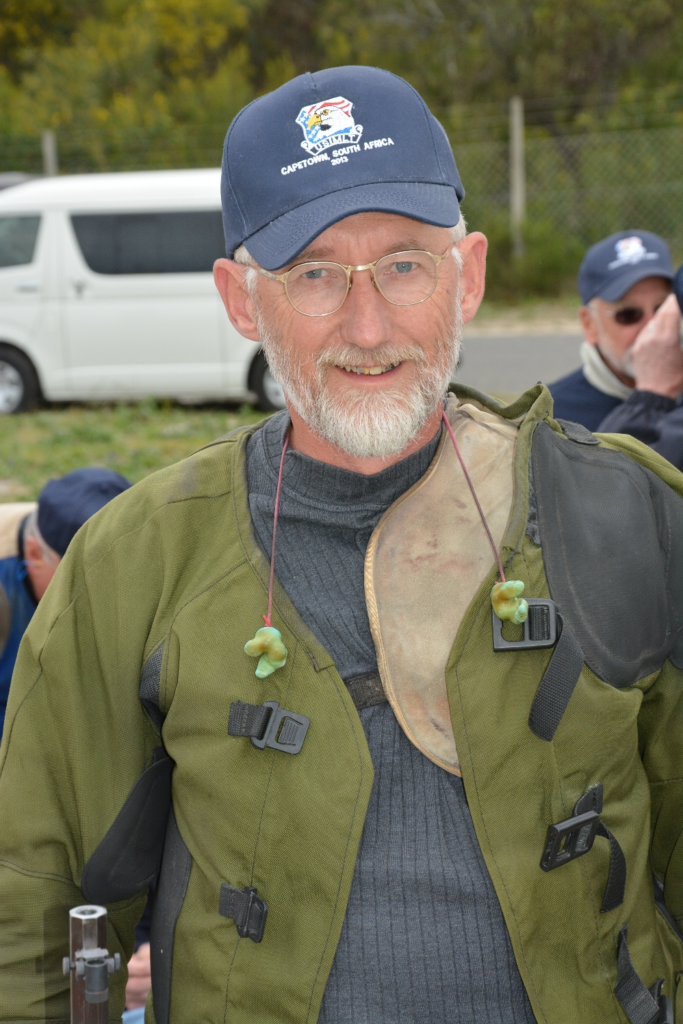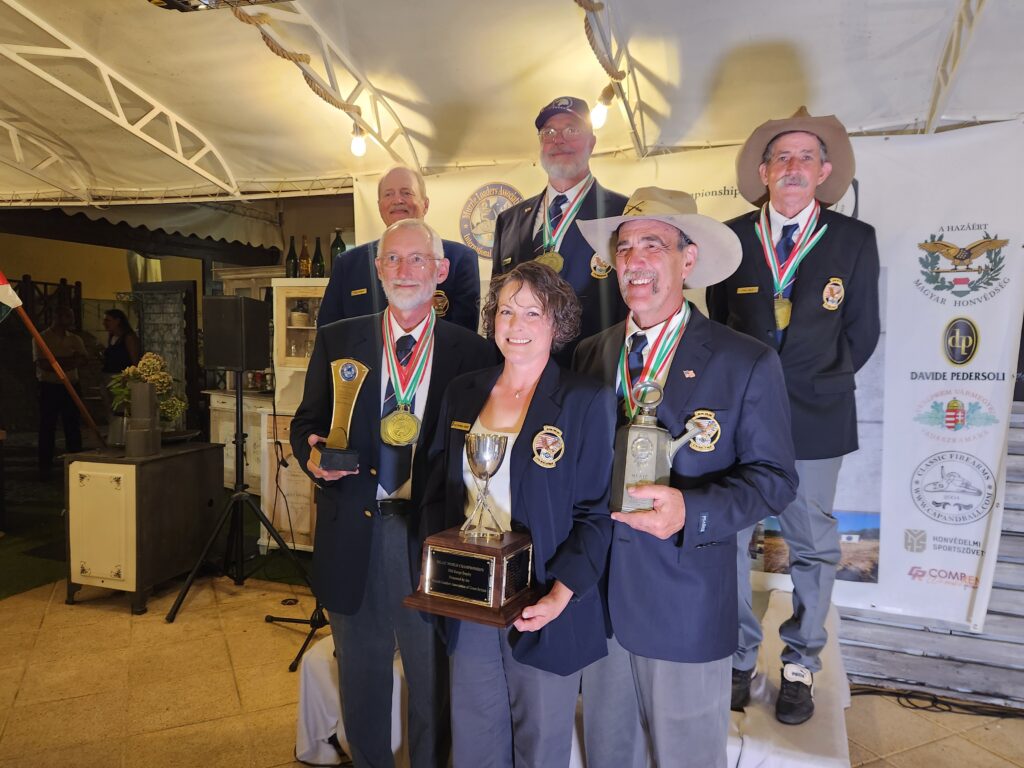John Ciccone (JC) conducted the Interview with Shaver (LS).

The U.S. International Muzzle Loading Team has three divisions. Long range, with distances far as 1,000 yards. Short range, using pistols, revolvers and long guns at 25, 50 and 100 meters and shotgun.
Lee Shaver of Lamar Missouri is the coach and the captain of the U.S. International Muzzle Loading Team. He has a stunning record.
In Long range world championship competition each distance is a separate event, so you can be crowned a world champion more than once in a world championship week. Shaver has been world champion seven times, the best he can count. Twice at this most recent world match, last year.
Aggregates, the cumulative points of the scores at each distance, 300, 500, 600, 900 and 1,000 yards are not considered events, but he has won a major aggregate 3 times.
In all, he has over 50 medals earned in world championships, between the gold, silver and bronze, individual, aggregate and team medals. He has placed in the top five of the grand aggregate five of the last six world championships. Four of those in the top two spots.
He holds 6 National Rifle Association national records with a muzzleloader, and 2 world records.
While he has not kept track it can safely be is assumed that he is likely the most internationally decorated long range muzzle loading rifleman competing today.
He also serves on three international committees, including chairman of the International Long Range committee, where he oversees the writing of the competition rules.
JC: You’re the coach as well as the team captain. Can you tell me what major competitions you’ve been in?
LS: Not just with the muzzleloaders but black powder in general. I’ve shot in numerous national championships and 15 World Championships.
JC: How many championships have you actually won?
LS: In all, I think I have just over 50 medals earned in world championships, between the gold, silver and bronze, individual, aggregate and team medals.
JC: How does someone learn about shooting a muzzle loader at really long range?
LS: Well, there are some books out there, most of them geared towards high power rifle, although there’s one or two that touch on black powder cartridge, which is mostly just lower velocity stuff. And, and there are some you might call “wind doping 101”. That’s just the basics. There’s so much that’s not in print, the stuff that comes into play at really low velocities. With black powder we’re throwing 550 grain bullets a 1000 yards, at maybe 1300 feet per second. At that distance and those velocities, if there is a slight change in wind or a cloud comes over, you can miss the target because you needed to make an elevation or windage change. Fine nuances like that. If you have a good mentor you can learn and get pretty good in four or five years. You get the basics quickly, but you spend years learning to apply the little things that make a difference.
JC: Someone suggested that one of the ways to practice for long range is to shoot a .22 Long rifle cartridge at a distance of about 200 yards. Does that make any sense to you?
LS: Well, I actually do most of my practicing with a .22Lr. At 200 yards it is roughly equivalent to shooting black powder at middle distances like 500 or 600 yards. If you want to find out what 1000 yard shooting is, you have to use a 2 foot-square target at 300 yards with the .22Lr. So, that’s how hard long range muzzle loading is.
JC: In terms of starting out shooting long range muzzle loading, if you’re an old guy, for example, I’m 76, this would be no time to start. It is physically demanding, to be on an open field with the sun, beating down on you, having to pick up your gear and move from one berm to the next. What do you think about that?
LS: Well, you’re exactly right. Out there the sun and the wind, it just wears on you. If you want to get into it, go to one of the local smaller matches where you can shoot a match in a day and have fun.
JC: What are you looking for in someone who would be a good candidate for the long range team?
LS: The best shooters are usually really laid back and relaxed when stress hits them. When things go wrong they handle it. If they are good team players you can take a few guys like that and you can do really well. What you don’t want is somebody that’s really high strung. But the best shooters, the best, absolutely best shooters are relaxed, even tempered and quick witted.
What I’m looking for is basically what we had when we went to Hungary. Good men and women that were team players. If someone needed to step aside and let somebody else do something, they were ever willing to do it. We don’t want somebody that’s “it’s all about me”.
I was very fortunate in that the men and women that selected to go are all really strong team players. Everyone did something for someone else during the week. We wouldn’t have survived if it hadn’t been that way because we lost so much equipment in transit. For example, Dave Gullo was wearing my glasses when he shot and, and Tony Martello was shooting bullets from the South Africans and we had to make all this stuff work and fit and help guys lube or paper patch their bullets to get them ready to shoot. We were up till 11 o’clock at night trying to get ready for the first day. But, we borrowed enough stuff to get by.

Team photo, awards ceremony:
Back row, left to right: Tony Martello, Steve Farringer, Chip Mate.
Front row, left to right:
Lee Shaver, Crystal Bentlage-Gerbitz team adjutant, and Dave Gullo.
JC: I know what you mean. The short range team has a group on the Signal AP. A lot of the, Canadian team members are on as well. We share a lot of information and we’ve come to think of them as our “Brothers in the Frozen North”.
LS: When I started developing a team, I explained to the guys that you will be shocked at how many friends you make in other countries. Some of my best friends are in Germany and South Africa.
The sportsmanship is just pretty amazing and the new guys are always shocked as to how much someone would pat them on the back. “You’ve done well and oops, you beat me today, but I’ll beat you tomorrow … that kind of thing.
JC: Are you still making the Ferris Rifle?
LS: Yes. My main business is manufacturing sites and then we have a full machine shop where we’re making contract parts for companies. Building the Ferris Rifle for me is really something I’ve always done in my spare time, which is really limited. So I build one or two guns a year and it has come to the point where it needs to be for someone that’s taken the long range muzzle sports seriously. I no longer build them for casual shooters. And I don’t really care what country they’re from. I’ve had guys from France, Norway, South Africa and Australia all shooting my guns and all doing it really well.
I had two new team members that were shooting the Pedersoli Gibbs, which are really good rifles. They really made the sport what it is today because it is a gun that you could buy off the shelf and be competitive with it.

JC: Is there one brand of black powder that is superior to the others?
LS: I’ve got a couple of other brands that I’ll shoot with on practice days and my scores are the same as when I’m shooting Swiss powder. But, my site settings will be different. In the overseas championships the only powder available is Swiss. So you have to know what your gun will do with Swiss powder. A lot of guys shoot it all the time.
The nice thing about Swiss is that it is so consistent from one batch to the next that you can load and hit the target at 1,000 yards. As for most of the other brands, they vary enough from batch to batch that you won’t do that. Moreover, another nice thing about Swiss is that it may be the cleanest burning powder. So if you want to use that criteria, then it is the best.
Long-range muzzle loading is one of the most challenging of all shooting disciplines and demands practice and commitment as well as some match experience to perform at high levels. But the sport, because of the investment in time, effort and commitment, is one of the most satisfying. For more information contact the Long Range Team captain, Lee Shaver, at longrangeml@gmail.com